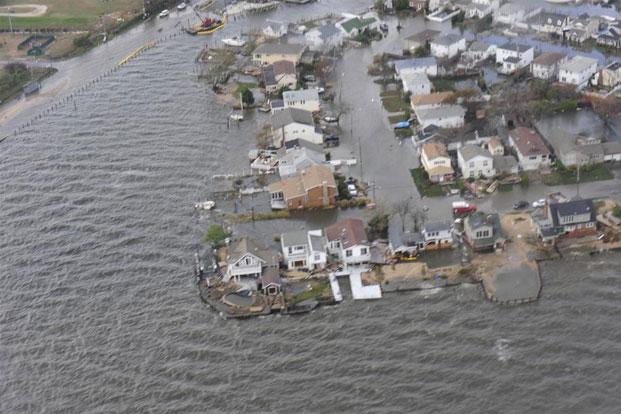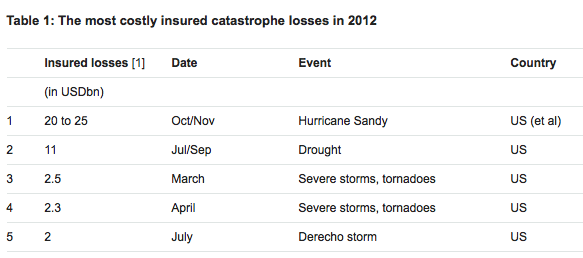The world’s largest insurers are tallying the costs of climate inaction, and the numbers are staggering.
Swiss Re announced recently that total economic losses in 2012 from “natural catastrophes and man-made disasters” – primarily weather events – should reach roughly $140 billion. Over 11,000 lives were lost due to the so-called “natural catastrophes” alone.
According to the Swiss Re report, “Natural and man-made catastrophes in 2012,” the top five insured loss events are all in the U.S.
“Hurricane Sandy is the largest Atlantic hurricane on record in terms of wind span. This record storm surge caused widespread flooding and damage to a densely populated area on the East Coast of the U.S. It also led to the worst power outage caused by a natural catastrophe in the history of the U.S.”
But Sandy wasn’t the only event to blame. According to the report, “extremely dry weather conditions and limited snowfall in the U.S. led to one of the worst droughts in recent decades, affecting more than half of the country. Drought-related agricultural losses are likely to reach approximately $11 billion, including pay-outs from federal assistance programs.
This marks the second time in three months that one of the world’s largest reinsurance companies has put hard economic numbers to the weather-related disasters that are growing so increasingly apparent in this warming world. In October, Munich Re, the world’s largest reinsurance company, published “Severe weather in North America,” which analyzed the past 30 years of weather-related disasters, and showed a clear rising trend for both extreme weather events and the costs of recovery.
The Munich Re report helps put Swiss Re’s publication in context.
The company’s analysis shows a nearly quintupled number of weather-related loss events in North America for the past three decades, compared with a quadrupling in Asia, 2.5 times as many events in Africa, twice as many in Europe and 1.5 times in South America.
While climate change wasn’t mentioned in this particular Swiss Re report, it is repeatedly on their website and in their literature. Munich Re didn’t dance around the issue in their October report:
Anthropogenic climate change is believed to contribute to this trend, though it influences various perils in different ways. Climate change particularly affects formation of heat-waves, droughts, intense precipitation events, and in the long run most probably also tropical cyclone intensity. The view that weather extremes are becoming more frequent and intense in various regions due to global warming is in keeping with current scientific findings…
“In all likelihood, we have to regard this finding as an initial climate-change footprint in our US loss data from the last four decades. Previously, there had not been such a strong chain of evidence. If the first effects of climate change are already perceptible, all alerts and measures against it have become even more pressing.”
Tony Kuczinski, CEO of Munich Reinsurance America, took it even further:
This publication represents another contribution to the global dialogue concerning weather-related activities and their causes. What is clearly evident when the longterm data is reviewed is that losses from weather events are trending upward. To simply say that this trend is a statistical anomaly or part of a long-term cycle of activity misses the point of these efforts – we must set aside our biases and continue a meaningful dialogue in search of answers to mitigate the losses that we are experiencing.
These reports land alongside a November publication by PricewaterhouseCoopers (PwC) that warned of a frightful 6 degree Celcius rise in global temperatures if government ambitions (or lack thereof) remain at current levels.
Said PwC partner Leo Johnson. “Now one thing is clear: businesses, governments and communities across the world need to plan for a warming world – not just 2C, but 4C or even 6C.”
The report explains:
Even doubling our current rate of decarbonisation would still lead to emissions consistent with 6 degrees Celcius of warming by the end of the century. To give ourselves a more than 50% chance of avoiding 2 degrees Celcius will require a six-fold improvement in our rate of decarbonisation…
Governments’ ambitions to limit warming to 2C now appear highly unrealistic. This new reality means that we must contemplate a much more challenging future. Whilst the negotiators continue to focus on 2C, a growing number of scientists and other expert organisations are now projecting much more pessimistic scenarios for global temperatures. The International Energy Agency, for example, now considers 4C and 6C scenarios as well as 2C in their latest analysis.
Now consider this troubling calculus: if the record losses reported by Swiss Re and Munich Re are the result of less than 1 degree Celcius of warming, one can only imagine what the economic impacts would be in a world thta’s 6 degrees warmer. And that’s to say nothing about loss of lives, health impacts, hunger, and global security.
For now, at least, the money is talking. And the cold, hard financial facts laid bare by the insurers should convince anyone that it’s time to get serious about climate change.
Subscribe to our newsletter
Stay up to date with DeSmog news and alerts








